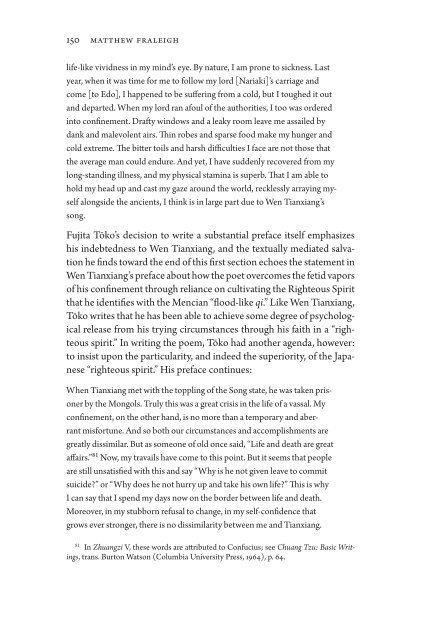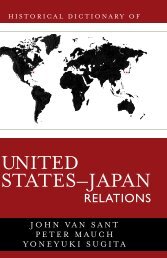JAPANESE SONGS OF HIGH PURPOSE 149through Shōin’s matched composition. Yet, a rigorously matched compositionwas not <strong>the</strong> only way in which Japanese shishi domesti cated<strong>the</strong> “Song <strong>of</strong> <strong>the</strong> <strong>Righteous</strong> <strong>Spirit</strong>,” <strong>and</strong> Shōin was not <strong>the</strong> first shishi toproduce a Japanese version <strong>of</strong> <strong>the</strong> work. Fourteen years earlier, whileunder house arrest, <strong>the</strong> Mito scholar Fujita Tōko had written “MatchingWen Tianxiang’s ‘Song <strong>of</strong> <strong>the</strong> <strong>Righteous</strong> <strong>Spirit</strong>.’”78 In a significantdeparture from <strong>the</strong> typical custom in such “matching” ( J. wa; Ch. he和 ) poems, he made no attempt whatsoever to echo Wen Tianxiang’soriginal rhymes, but clearly <strong>the</strong> work was never far from his mind.79 In<strong>the</strong> elaborate preface that accompanies his version, Tōko details howWen Tianxiang’s poem had long been an inspiration to him:When I, Takeki, was eight or nine years old, I learned <strong>of</strong> Wen Tianxiang’s“Song <strong>of</strong> <strong>the</strong> <strong>Righteous</strong> <strong>Spirit</strong>” from my late fa<strong>the</strong>r.80 Whenever my latef a<strong>the</strong>r recited <strong>the</strong> song, he would beat out time with cup in h<strong>and</strong>, fervent<strong>and</strong> impassioned. He would explain how Heaven <strong>and</strong> Earth were filled witha righteous spirit, <strong>and</strong> would insist that one must follow it all <strong>the</strong> way to itsbasis in <strong>the</strong> great virtues <strong>of</strong> loyalty <strong>and</strong> filial piety. That was over thirty yearsago now. For every ten works <strong>of</strong> poetry <strong>and</strong> prose that I could recite whenI was young, I have probably forgotten seven or eight <strong>of</strong> <strong>the</strong>m. But when itcomes to Tianxiang’s song, I recall each line perfectly <strong>and</strong> haven’t forgottena single word. Moreover, my late fa<strong>the</strong>r’s voice <strong>and</strong> visage appear with<strong>of</strong> Thomas Mann’s “Tonio Kröger,” representing sensitive artistic withdrawal; <strong>and</strong> YoshidaShōin, representing impassioned social engagement; see Emiko Ohnuki-Tierney, KamikazeDiaries: Reflections <strong>of</strong> Japanese Student Soldiers (Chicago: University <strong>of</strong> Chicago Press,2006), p. 89.78In 1844, <strong>the</strong> shogunate ordered Tōko’s lord, Tokugawa Nariaki, to report to Edo,whereupon he was stripped <strong>of</strong> his status as daimyo <strong>of</strong> <strong>the</strong> Mito domain. Tōko accompaniedhis lord <strong>and</strong> was placed under house arrest in <strong>the</strong> Mito domain residence in Edo. Inaddition to <strong>the</strong> “Song <strong>of</strong> <strong>the</strong> <strong>Righteous</strong> <strong>Spirit</strong>,” Tōko wrote a poetic life history entitledKaiten shishi 回 天 詩 史 while he was in captivity.79The poem is titled “Bun Tenshō no ‘Seiki no uta’ ni wasu; narabini jo” 和 文 天 祥正 氣 歌 并 序 , <strong>and</strong> I have used <strong>the</strong> version in Sakata, Shishi, pp. 38–62. It has also been reprintedin Maki, Bun Tenshō, Fujita Tōko, Yoshida Shōin Seiki no uta shōkai, pp. 43–83, <strong>and</strong>in Takano, Shishi bungaku, pp. 46–75. The explications in <strong>the</strong>se two versions by Maki <strong>and</strong>Takano are strikingly similar, suggesting that Takano ei<strong>the</strong>r relied on Maki or else both<strong>of</strong> <strong>the</strong>m relied on a third source, perhaps Seiki no uta zokkai 正 気 歌 俗 解 , <strong>the</strong> 1867 commentaryprepared by Oyama Shunzan 小 山 春 山 (also known as Tomohiro 朝 弘 ; 1827–1891), a former student <strong>of</strong> Ōhashi Totsuan who participated in <strong>the</strong> Sakashitamon incident.Shunzan apparently prepared <strong>the</strong> commentary for <strong>the</strong> use <strong>of</strong> his academy students.80Here Tōko uses his given name, Takeki 彪 ; Tōko’s fa<strong>the</strong>r, <strong>the</strong> Confucian scholar FujitaYūkoku 藤 田 幽 谷 (1774–1826), was a founding figure <strong>of</strong> <strong>the</strong> Mito school.
150 MATTHEW FRALEIGHlife-like vividness in my mind’s eye. By nature, I am prone to sickness. Lastyear, when it was time for me to follow my lord [Nariaki]’s carriage <strong>and</strong>come [to Edo], I happened to be suffering from a cold, but I toughed it out<strong>and</strong> departed. When my lord ran afoul <strong>of</strong> <strong>the</strong> authorities, I too was orderedinto confinement. Drafty windows <strong>and</strong> a leaky room leave me assailed bydank <strong>and</strong> malevolent airs. Thin robes <strong>and</strong> sparse food make my hunger <strong>and</strong>cold extreme. The bitter toils <strong>and</strong> harsh difficulties I face are not those that<strong>the</strong> average man could endure. And yet, I have suddenly recovered from mylong-st<strong>and</strong>ing illness, <strong>and</strong> my physical stamina is superb. That I am able tohold my head up <strong>and</strong> cast my gaze around <strong>the</strong> world, recklessly arraying myselfalongside <strong>the</strong> ancients, I think is in large part due to Wen Tianxiang’ssong.Fujita Tōko’s decision to write a substantial preface itself emphasizeshis indebtedness to Wen Tianxiang, <strong>and</strong> <strong>the</strong> textually mediated salvationhe finds toward <strong>the</strong> end <strong>of</strong> this first section echoes <strong>the</strong> statement inWen Tianxiang’s preface about how <strong>the</strong> poet overcomes <strong>the</strong> fetid vapors<strong>of</strong> his confinement through reliance on cultivating <strong>the</strong> <strong>Righteous</strong> <strong>Spirit</strong>that he identifies with <strong>the</strong> Mencian “flood-like qi.” Like Wen Tianxiang,Tōko writes that he has been able to achieve some degree <strong>of</strong> psychologicalrelease from his trying circumstances through his faith in a “righteousspirit.” In writing <strong>the</strong> poem, Tōko had ano<strong>the</strong>r agenda, however:to insist upon <strong>the</strong> particularity, <strong>and</strong> indeed <strong>the</strong> superiority, <strong>of</strong> <strong>the</strong> Japanese“righteous spirit.” His preface continues:When Tianxiang met with <strong>the</strong> toppling <strong>of</strong> <strong>the</strong> Song state, he was taken prisonerby <strong>the</strong> Mongols. Truly this was a great crisis in <strong>the</strong> life <strong>of</strong> a vassal. Myconfinement, on <strong>the</strong> o<strong>the</strong>r h<strong>and</strong>, is no more than a temporary <strong>and</strong> aberrantmisfortune. And so both our circumstances <strong>and</strong> accomplishments aregreatly dissimilar. But as someone <strong>of</strong> old once said, “Life <strong>and</strong> death are greataffairs.”81 Now, my travails have come to this point. But it seems that peopleare still unsatisfied with this <strong>and</strong> say “Why is he not given leave to commitsuicide?” or “Why does he not hurry up <strong>and</strong> take his own life?” This is whyI can say that I spend my days now on <strong>the</strong> border between life <strong>and</strong> death.Moreover, in my stubborn refusal to change, in my self-confidence thatgrows ever stronger, <strong>the</strong>re is no dissimilarity between me <strong>and</strong> Tian xiang.81In Zhuangzi V, <strong>the</strong>se words are attributed to Confucius; see Chuang Tzu: Basic Writings,trans. Burton Watson (Columbia University Press, 1964), p. 64.













